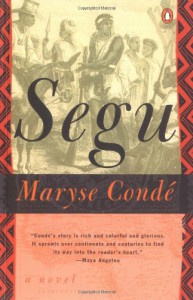
There seems to be a trend or a desire to look at Africa certain ways. In one part, it seems (at least in American news eyes) to see it as a one big country. In another, it seems like it has now and colonization and that’s it. When one reads about the exploration of Africa, it is with a Western center, and little about the people who actually live there.
In many ways Conde’s novel Segu does much to attack this perception. Segu takes place in a fading (a real kingdom) and chronicles a family whose fortunes, or lack thereof, mirrors the kingdom’s. It is about a struggle to break free of the chains of the past while challenging the role of progress.
Part of the danger or change comes from the obvious – slavery and transportation to the “New” World. Another danger is the arrival and spreading of religion – both Muslim and Christianity. As one son decides to be Muslim because of the power of the written word (confusing the two as well with a desire to not be as his father), he disregards his brother, whose view on religion is more pragmatic. There is the one son who, strangely, almost manages the best life under startling circumstances.
The book is frustrating, not because of the style or because it isn’t good (one can quite easily see why it would a prize) but because the reader can see the effect and pull of history. There is disappointment because the characters are true people, and, therefore not saints or sinners, but both in one body.
 7
7








